The website for Transnational Resistance has now moved to one hosted by the History Faculty, University of Oxford. This current site will be archived. For all future updates and information on the project, please go to:
New books: Vilma Steindling; Franz Marek
Two books have been published recently:
A biography of Vilma Steindling, who was a member of the Travail Allemand group in Paris
Vilma Steindling: Eine jüdische Kommunistin im Widerstand
Mit einem Nachwort von Anton Pelinka
by Ruth Steindling and Claudia Erdheim
https://amalthea.at/produkt/vilma-steindling/
A collection of writings by Franz Marek, who was one of the Travail Allemand leadership. It includes a previously unpublished memoir of around 120 pages.
Franz Marek: Beruf und Berufung Kommunist
Lebenserinnerungen und Schlüsseltexte herausgegeben und eingeleitet von Maximilian Graf und Sarah Knoll
http://www.mandelbaum.at/books/806/7722
Conference: Italy’s Decade of War: 1935-45 in International Perspective
6-7 September 2016, University of Strathclyde, Glasgow
Keynote Speakers:
Professor MacGregor Knox, LSE
Professor Nicola Labanca, Università degli Studi di Siena
Registration now open
To register for the conference, please visit the online shop.
Background
From the invasion of Abyssinia to the end of World War Two, Italy experienced a decade of war. This conference aims to re-evaluate the history of the Italian experience during this ten-year period with a unifying perspective that places the Italian Fascist regime and its foreign and military enterprises in an entirely internationalised framework of analysis. It will bring an international focus upon the Italian role in the break-down of the international system and appeasement, and will analyse the consequences of Italian militarism on a global scale. It will explore comparative and transnational histories of the Italian occupations of France, the Balkans, Greece, and Albania, as well as the Allied occupation of Italy following the defeat. The conference will seek to place particular emphasis upon the significance of the Mediterranean region in the wider history of the Second World War, exploring the broader implications of Italy’s actions in Africa and the Middle East. It will also look at Italian diplomatic, military and economic relations with Britain, the United States, and Nazi Germany, as well as those with other states such as Vichy France and Spain.
This conference aims to bring together scholars working in the fields of military, political, diplomatic, international, colonial, transnational, and comparative history, and encourages inter-disciplinary contributions. The conference organisers aim to publish selected papers in an edited volume and a journal special issue.
Conference organisers: Dr Karine Varley (University of Strathclyde) Dr Marco Maria Aterrano (Università degli Studi di Napoli ‘Federico II’).
Contact Email: italywarconference@gmail.com
Twitter: #ItalyDecadeWar
New book: Rethinking Antifascism. History, Memory and Politics, 1922 to the Present
Hugo Garcia, Mercedes Yusta, Xavier Tabet, Cristina Climaco (eds.), Rethinking Antifascism. History, Memory and Politics, 1922 to the Present, Berghahn Books, New York, 2016.
Bringing together leading scholars from a range of nations, Rethinking Antifascism provides a fascinating exploration of one of the most vibrant sub-disciplines within recent historiography. Through case studies that exemplify the field’s breadth and sophistication, it examines antifascism in two distinct realms: after surveying the movement’s remarkable diversity across nations and political cultures up to 1945, the volume assesses its postwar political and ideological salience, from its incorporation into Soviet state doctrine to its radical questioning by historians and politicians. Avoiding both heroic narratives and reflexive revisionism, these contributions offer nuanced perspectives on a movement that helped to shape the postwar world.
Further information and table of contents here.
Download the Introduction here: http://www.berghahnbooks.com/downloads/intros/GarciaRethinking_intro.pdf
CfP: Fascist Warfare: A Concept to Understand Fascism and Total War in the First Half of the Twentieth Century
UAB, Barcelona, March 16-17 2017
Organising Committee: Javier Rodrigo, David Alegre and Miguel Alonso
Grup d’Estudis República i Democràcia, Department of Modern and Contemporary History, Universitat Autònoma de Barcelona
The main aim of this conference is to debate about the existence of a specific way of making war typical of fascism, that is to say, of the concept fascist warfare. Or, in other words, to reflect not only on its applicability, but also on its possible analytical and interpretative implications that its development would have both for the study of war in the twentieth century and for the study of fascism. For debating this issue we aim to count on the presence of scholars who have worked fascist regimes in times of war, mainly connected with two main elements: on the one hand, combat experience of the troops (mobilisation, violence, behaviour at the front, discipline, etc.) and, on the other hand, occupation policies (shootings, deportations, antipartisan policy, requisitions, economic exploitation, relations with civil population, etc.) Thus, we aim to tackle how war was set out in the ideological/conceptual level, hence including the sphere of mentalities, and how this war was waged in the frontlines and the rearguard, therefore paying attention to praxis.
Due to the dimensions planned for this conference, we will focus mainly on four cases of study, Germany, Italy, Spain and Croatia. This way, we are seeking to obtain a picture as complete and rich as possible in cases of study on which to build our debate, fundamentally with the aim of obtaining functional conclusions both at the theoretical and empirical levels, and above all to obtain a comparative and transnational perspective of the problem tackled, something we consider essential. Equally, and absolutely involved in the 80th Anniversary of the Spanish Civil War, this comparative and transnational perspective will allow us to connect the Spanish case with the nucleus of European fascisms and their war experiences, delving into this converging way that must be, and is, one of the main workhorses of Spanish historiography.
The conference will take place during two days, both in the morning and in the afternoon. We will invite 3 foreign scholars and a Spanish one, that is to say, one for each of the aforementioned cases of study. These scholars will make 4 lectures of 45 minutes tackling the different elements needed to establish the theoretical and factual limits of the proposed debate, that is, an analysis of mentalities, occupation policies, institutional machineries and combat experiences of the German, Italian, Spanish and Croatian fascisms during the thirties and the forties, as well as their multiple interrelations. Finally, beyond the lectures, a roundtable will take place in which the invited scholars will discuss, answering the questions posed both by a moderator and/or by the public, the limits, applicability and suitability of the concept fascist warfare, starting each from their own research experiences and from the elements tackled in the lectures.
Equally, we will open the conference to the selection of four or five papers among those proposals that we receive which will complement the issues tackled in the lectures, always on the basis of the debate around the concept fascist warfare and the different topics mentioned in the previous section. Besides, the organization will cover the expenses of travel and accommodation for the selected panellists. The papers will be grouped into the same discussion table in order to be debated altogether after being presented by one or two moderators. This way, we aim the debate to be the common base among all of them and what mark the nature of the session, rather than the mere and unconnected exposition of the papers. Therefore, this minimal selection of contributions will allow us to widen the discussion as well as the chronological and thematic boundaries defined in the lectures, making the conference a useful working platform able to produce the most feedback possible. And, also, we would be able to tackle both the questions and cases of study mentioned as well as other which could emerge during the debates and because of the different contributions and research experiences of the scholars attending the conference. Thus, our main goal is to provide a first approach to the concept fascist warfare and to weigh the possibilities of continuing working in this direction.
The deadline to send proposals is September, 30th 2016.
The proposals can focus on different cases and chronologies from the ones posed by the four lecturers, therefore these can deal with cases beyond the limits of the interwar period and the Second World War. These should include a title; a brief summary of 100-150 words where the author should explain his/her main thesis or the key questions he/she would deal with during the presentation; five keywords; and finally an explanation of 800-1000 words where he/she briefly develops the contents posed in the summary together with the main sources used in order to defend his/her thesis, explaining at the same time his/her position regarding the effectiveness and sense of the concept fascist warfare, how his/her proposal fits in this debate, as well as what can offer and which are his/her motivations to take part in this kind of conference. All of that should also include a brief curriculum vitae of 200 words. Needless to say that we will value specially these proposals that include transnational and/or comparative approaches, but also those which make original contributions from the thematic and methodological point of view. English will be the lingua franca of the conference in order to boost exchange and debate among the participants, in that sense we ask the proposers to send their proposals in that language or in both languages (English-Spanish; English-Catalan; English-German; English-Italian; etc.) The proposals should be sent to the following email addresses: miguel.alonso.ibarra@gmail.com or david.alegre.lorenz@gmail.com
Further information here.
CfP: Echoes of the Past: the refugee crisis and European collective memory
A special issue of Patterns of Prejudice edited by Dan Stone
In the October 2015 issue of the Journal of the Association of Jewish Refugees, Rabbi Walter Rothschild spoke of ‘public disgust at images of corpses on the beaches and reports of dozens suffocated in what were little more than mobile gas chambers on the Autobahns’. A few days later, the UN High Commissioner for Refugees, Zeid Ra’ad Al Hussein admonished European politicians for their use of dehumanizing rhetoric, saying that phrases such as ‘swarms of refugees’ used by David Cameron recalled the period before the Second World War when the world turned its back on Jewish refugees. ‘If you look back to Evian’, Al Hussein said, ‘and read through the intergovernmental discussion, you will see that there were things that were said that were very similar’. Since then Europe has both taken in hundreds of thousands of refugees and simultaneously mobilized to try and stop more from attempting the journey. Echoes of the past seem to resound every time that the current refugee crisis in Europe is discussed, with the Holocaust an especially vivid point of reference. What, if anything, does this seemingly instinctive response, connecting the experiences of those fleeing Nazism before the war, or survivors of it afterwards looking for a home, with those fleeing war and persecution in Syria, Afghanistan and Iraq, tell us about contemporary European identity and its rootedness in the past?
Topics on which proposals might focus include:
Links between pre-Second World War debates about refugees between states, among politicians and in the press, and similar debates today.
Debates about the admission of refugees before and after the Second World War and how they compare—or have shaped—today’s similar debates.
Accounts of how the experiences of different refugee groups have been incorporated in European collective memory in different ways, e.g. Hungarians fleeing in 1956, Ugandan Asians, Vietnamese ‘boat people’, Bosnians and Kosovars.
Analyses of how refugees themselves made sense of their experiences, from giving thanks to the countries that offered them refuge, to using their experiences to criticize racism and other forms of prejudice later on in their lives.
EU policies—e.g. Frontex’s operations—and how these are (mis)understood in different European settings.
Comparisons between Eastern and Western European collective memories and how these are made manifest in discussions in the public sphere over refugees. Why, for example, have Poland and Romania agreed to receive so few refugees from Syria, and why has Hungary rejected them altogether?
Theoretical discussions of the creation and contestation of collective memory, including far-right narratives of Europeanness and their impact on the public sphere.
Transnational and/or comparative approaches are especially welcome, although country-specific studies will also be considered.
Proposals (no more than 1 page) should be submitted to Professor Dan Stone (d.stone@rhul.ac.uk) by 30 June 2016.
CfP: Performing War: Acts of Transgression and Transformation
DeAnna Toten Beard, Baylor University
Jenna L. Kubly, Independent Scholar
This body will convene a diverse group of scholars, methodologies, and research interests to participate in an ongoing conversation about the complex relationship between war and performance. In concert with the larger conference theme, the working group is interested in projects that consider the many ways that transgressive acts associated with war—for example, physical destruction, psychic violence, border crossing, political betrayal—both transform performance and are transformed by/in performance.
Papers might address how theatre, drama, civic performances, musicals, operas, popular entertainments, re-enactments, and dance relate to the following ideas:
How does the environment of violence impact theatre in a war-zone? On the Home Front? In a P.O.W. camp or concentration camp?
What are the artistic and ethical implications of presenting images of wartime violence on stage?
How has war-time drama supported soldiers and citizens negotiating the transition from peace time to war time—and then back again?
How might war and war-time theater offer a liminal space for explorations of transgender/sexuality?
How do voices of pacifism and reconciliation become transgressive during the climate of war?
How does the literal act of border crossing by combatants in times of war create opportunities for transcultural performance? How is artistic border crossing made suspect by war?
How do translations or transmissions of war-time texts operate as propaganda, modes of resistance, or documents of “truth-telling”?
The goal of the working group is to form a community of scholars and practitioners invested in this unifying theme. Through two rounds of paper exchanges with small subgroups, each participant is offered the change to give and receive feedback and suggestions on the completed 15-20 page work. During the conference session, participants will caucus in groups over questions suggested by the convenors, before coming together for a discussion that will include all participants.
Images, video, music or other multimedia to accompany the papers are strongly encouraged, but the participant must be able share it with the group prior to the conference (i.e. via a website link or Dropbox). There will be no media provision in the conference session.
For any specific questions, please contact the working group convenors at DeAnna_Toten_Beard@baylor.edu and JLKubly@yahoo.com. Please note that all submissions must be received formally through the ASTR website, at http://www.astr.org/page/16_WGSubmissions. The form will allow you to indicate second and third -choice working groups if you wish; if you do so, note that there is a space for you to indicate how your work will fit into those groups. The deadline for receipt of working group proposals is 1 June 2016 and we anticipate that participants will be notified of their acceptance no later than 30 June. As this is the first year of this new process, please contact the conference organizers at astr2016@astr.org if you have any questions about the process.
The Conference and Organisation
The American Society for Theatre Research (ASTR) is a U.S.-based professional organization that fosters scholarship on worldwide theatre and performance, both historical and contemporary.
The 2016 Conference will be held November 3-6, 2016
Minneapolis Marriott City Center
30 S 7th St
Minneapolis, MN 55402
Mehmet Shehu – The Forgotten Number Two
“The Designated Successor was found dead in his bedroom at dawn on December 14 [1981]. Albanian television made a brief announcement of the facts at noon: ‘During the night of December 13, the Successor succumbed to a nervous depression and took his own life with a firearm’.” The well-known Albanian writer Ismail Kadare dedicated a book to the unsolved circumstances of Mehmet Shehu’s death, providing insight into the mechanics of Albanian society under Enver Hoxha.¹ Up to the present day, no historian has written a biography of the long-time designated successor of Hoxha, who became, thereafter, public enemy number one. Information about his person remains rare.
Mehmet Ismail Shehu, the son of an Imam, was born in 1913 in Çorrush, in Southern Albania. Until today, he is known as one of the most prominent Albanian Communist Partisans during the Second World War and as a leading figure of the Albanian resistance before Enver Hoxha seized power. Shehu graduated in 1932 from the Tirana “Albanian vocational academy” and joined the Reale Academia Militare Nunziatella of Naples in Italy where he held a scholarship. After being expelled from the academy in 1936 for his pro-Communist sympathies, he changed to the Tirana Officers School.
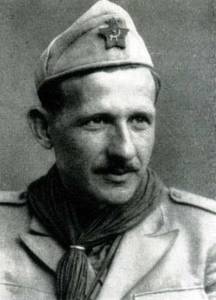
The following year, he left Albania to become a Republican volunteer in the Spanish Civil War as a member of the Communist Party. He commanded the Fourth Battalion of the XIIth Garibaldi Brigade. On his way back to Albania after the defeat of the Republican forces, he was arrested and interned in France in early 1939. Later, Shehu was transferred to an Italian internment camp where he joined the Italian Communist Party.
In 1942, he returned to Albania – which was now under Italian control – where he immediately joined the Albanian Communist Party and the Albanian resistance. Due to his military experience he rose to the rank of the commander of the 1st Partisan Assault Division of the National Liberation Army. From 1944 to 1945 he was a member of the provisional government, the Anti-Fascist Council of National Liberation. After the German withdrawal in November 1944, Shehu became chief of the general staff under Enver Hoxha. From 1954 to 1981, he served as prime minister and from 1974 onwards also as minister of defence. In December 1981 after the outbreak of smouldering differences with Hoxha, he fell from grace, was accused of being a traitor and a multiple agent and his whole family was arrested and imprisoned. He committed suicide in December 1981 after being denounced as an “enemy of the state”. To the present day however, strong suspicion remains that it wasn’t suicide, but murder – ordered by Hoxha.²
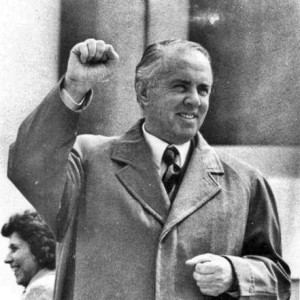
Mehmet Shehu seems to have had two faces: he was not only a statesman with abundant strategic and tactical experience but also a renowned savage butcher: during the war he was said to have decapitated about seventy Italians with his own hands. He was a staunch enemy of the Roma population, which he wanted to exterminate.
The damnatio memoriae of Mehmet Shehu ordered by Enver Hoxha remains until this day. It seems impossible to gather much information about Shehu and his life. Yet hopefully, this dilemma is about to change in the near future as Albanian and other European historians eventually integrate Albania as a topic in the history of Europe.
Notes
¹ Ismail Kadare, The Successor, Edinburgh 2005, p. 1.
² Robert Elsie, A Biographical Dictionary of Albanian History, London 2013, p. 410.
Sources
Robert Elsie, A Biographical Dictionary of Albanian History, London 2013
Blendi Fevziu, Enver Hoxha: The Iron Fist of Albania, London 2016
Ismail Kadare, The Successor, Edinburgh 2005
Mehmet Shehu, Der Kampf um die Befreiung Tiranas, Tirana 1980
Franziska Zaugg, Albanische Muslime in der Waffen-SS, Von „Großalbanien“ zur Division „Skanderbeg“, Krieg in der Geschichte, Bd. 96, Paderborn 2016
When you are uprooted the world looks different
How would being uprooted from your home make you feel? What might be the effect on your behaviour, actions, and interpretation of the world? War, persecution and economic reasons can all contribute to people being displaced from their homes and land. They are not only confronted with new, potentially strange, experiences, but also they develop fundamentally different perceptions from those people who are left behind or whom they encounter in the new places they come to live. Their home, their current surroundings, their destination and, ultimately, who they are, are all seen through a different lens.
Refugees in the Netherlands
During the 1930s, a great number of refugees – possibly as many as half a million people – arrived in the Netherlands from Germany and central Europe. Their impact on the population figures, which in 1930 stood at only 7,825,000, was significant. Most of these refugees did not have any clear ideas about the country they had arrived in. Many of them had already travelled through a number of countries; others were just focused on the main Dutch harbours that could provide passage to their desired destinations, be it Britain, the US, South America or Palestine.
Some of these refugees, however, remained focused on their country of origin; for example, the large contingent of communists from Germany. But whatever their focus or ideas regarding their hoped for destination, all these people had to interact with the inhabitants of the country they passed through. In some cases, this meant an exchange in ideas, information, experiences and practices with regard to resistance against Nazi-Germany.
Encounters lead to actions
While still living with her parents, Dinie Heroma was deeply influenced by these encounters:
“My parents always had people staying over from Germany, who were on their way fleeing to America, there was often no place for them so they had to wait until there was place for them on the boat; in the meantime they stayed at my parents. There I heard a lot about Germany. I felt that if fascism would also win in Spain then all of us are lost and therefore I went. I was a nurse.”¹
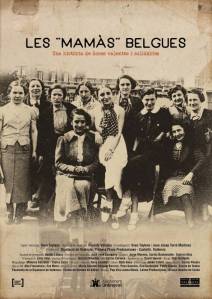
Young adults like Dinie were thus influenced in their perception of the world and in thinking about who they wanted to be and what they wanted to do. Dinie went to Spain to assist as a nurse – a much needed skill – in the Spanish Civil War. Returning home after the defeat of the republican side, she was soon confronted by the German occupation of the Netherlands itself. Unlike many other former Spanish volunteers, this time Dinie did not engage in resistance activities. Instead, she focused on her job as a nurse. Thus showing that fighting against fascism in Spain did not necessarily mean engaging in resistance later on.
Other Dutchmen and -women, however, who had also been active in the Spanish Civil war had been uprooted at a fundamental level: they now had to live as foreigners in the Netherlands. Registering in a foreign army had resulted in the loss of their citizenship; but what also set them apart was living in a country that had not seen war since Napoleon when they themselves had gained experience in combat.² Consequently, they were ‘different’ from others and already on the brink of illegality even before the occupation started. They often moved underground relatively easily, it seems.
Being trapped and reinventing ways to move on
At the same time, refugees moving through Europe became trapped when Holland was occupied in 1940 and so had to rethink their trajectories. Jewish refugees, like the young Zionists from the Hachshara schools, in particular, remained focused on reaching Palestine but had to rethink how they would get there.
Social support from Dutch nationals now changed into help in finding places to hide, or to escape the country. Consequently, help developed towards resistance. In addition to providing people with food, shelter and transport, illegal acts were ‘invented’ to make these things possible: stealing or forging identity documents, robbing so called ‘distribution offices’ or teaming up with petty criminals, smugglers and others on the margins of society in order to help people move on, across the borders.
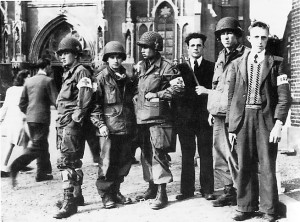
Same place, different outlook
People uprooted and on the move have a fundamental different outlook on a given place, compared to those who are rooted there. We can see how in the Netherlands the struggle against occupation, which was mainly a national affair focused on national objectives and ideas of national freedom and patriotism, contributed to how Zionists or German communists were either using or frustrating the Nazi system of oppression.
Although sharing the same enemy, young Zionists, German communists and left-wing Dutch in the end looked in different directions when it came to the question of where and in what kind of world they hoped to end up. A sense of being uprooted held them all in its grip and made it possible for them to encounter and learn from each other, and they sometimes even adopted each other’s dreams and objectives, adapted to their own experiences and views of the world.
Notes
¹ Interview Hinke Piersma with Dinie Heroma January 1997, p. 1.
² Between the French period and the German invasion in 1940 the Netherlands were only involved in colonial wars in their overseas empire, mainly the Dutch East Indies (now Indonesia).
Exhibition in Focus: The Channel Islands, Nazi persecution and the Holocaust
Thursday 9 Jun 2016, 6pm-8pm
6 – 6:30 pm: Exhibition viewing
6:30 – 8:00 pm: Lecture and discussion
The history of Nazi persecution in the Channel Islands during the German occupation of 1940-1945 has long been marginalised, even within the islands themselves. No ‘roll of honour’ was ever kept of those who were sent to prisons and concentration camps on the continent for acts of resistance. The exact numbers of those sent away are still not known. The memory of many of these people was not held in high esteem in the decades after the war. Discussion of the Jews deported from the Channel Islands was an even more delicate subject for discussion, as their story potentially involved the tabooed c-word (collaboration). This lecture sheds light on the silence surrounding victims of Nazism in the Channel Islands and gives voice to some of their extraordinary stories.
This lecture is part of a series of programming designed to highlight aspects of the exhibition, Dilemmas, Choices, Responses: Britain and the Holocaust, co-curated by the Holocaust Educational Trust’s Regional Ambassadors and the Wiener Library. Among other topics, the exhibition includes documents and pamphlets on Nazi persecution in the Channel Islands. Participants will have the opportunity to view the exhibition prior to the lecture.
Dr Gilly Carr is a Senior Lecturer in Archaeology at the University of Cambridge, where she is also a Fellow and Director of Studies at St Catharine’s College. Her research focuses on victims of Nazism in the Channel Islands, post-conflict heritage studies, and conflict archaeology. She is the author of over 50 publications. Recent publications include Protest, Defiance and Resistance in the Channel Islands: German Occupation 1940-1945 (Bloomsbury 2014, with Paul Sanders and Louise Willmot) and Legacies of Occupation: Heritage, memory and archaeology in the Channel Islands (Springer 2014). She has recently made a BBC documentary about her research which will be screened in May 2016.
Admission is free but booking is essential as space is limited.
Contact Info:
The Wiener Library for the Study of the Holocaust and Genocide
+44 (0)20 7636 7247
29 Russell Square, London, WC1B 5DP
Contact Email:
info@wienerlibrary.co.uk
URL: http://www.wienerlibrary.co.uk/Whats-On?item=257
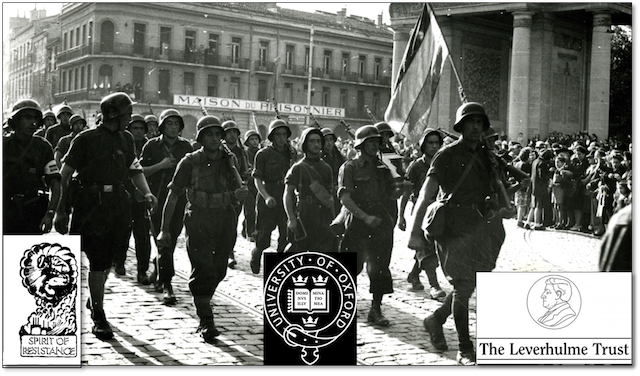
You must be logged in to post a comment.